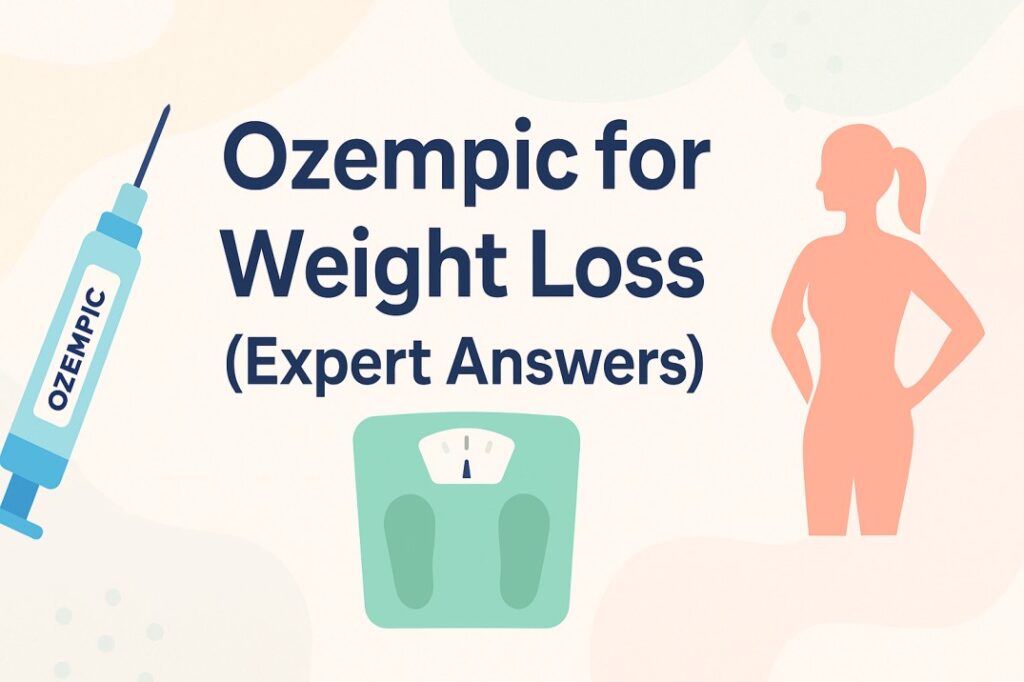In the ever-growing world of weight loss solutions, Ozempic has emerged as a topic of great interest. If you’ve heard about it but aren’t sure what all the hype is about, you’re not alone. Whether you’re considering it for yourself or just curious about how it works, this comprehensive guide is designed to give you a deep understanding of Ozempic for weight loss — complete with science-backed facts, patient experiences, expert insights, and practical advice.
1. Understanding Ozempic
Ozempic is the brand name for semaglutide, a GLP-1 receptor agonist originally developed to help people with type 2 diabetes manage their blood sugar levels. By mimicking the hormone GLP-1, it improves insulin secretion and reduces glucagon release, thereby improving blood sugar regulation. But while its diabetic benefits were being studied, an unexpected but welcomed side effect was discovered — weight loss.
1.1 What Makes It Unique?
Unlike traditional weight loss pills that often act as stimulants, Ozempic works by affecting the brain’s hunger signals. It slows down gastric emptying and makes you feel full longer, effectively reducing appetite and caloric intake. It also improves metabolic function and has heart health benefits — something not common in most diet medications.
2. How Ozempic Affects the Body
Ozempic interacts with the GLP-1 receptors in the body. Here’s how that plays out:
- Enhances insulin secretion when glucose is high
- Suppresses the release of glucagon
- Slows down stomach emptying
- Reduces appetite by acting on the brain’s hunger centers
This combination not only regulates blood sugar but also supports weight loss by decreasing food intake and controlling cravings.
3. The Research Behind Ozempic for Weight Loss
Several high-profile studies, including the STEP clinical trial series, have documented the effectiveness of semaglutide in weight management. According to a study published in the New England Journal of Medicine, participants lost nearly 15% of their body weight over 68 weeks with weekly semaglutide injections. This is a significant achievement compared to traditional methods and even some surgical options.
3.1 Comparative Results
When compared with a placebo, participants taking Ozempic lost nearly five times more weight. Another study showed that pairing Ozempic with moderate exercise and a calorie-deficit diet produced even better outcomes, including improvements in cardiovascular and metabolic health.
4. Who Should Consider Ozempic?
Ozempic is typically prescribed for:
- People with type 2 diabetes and a need for improved blood sugar control
- Individuals with a BMI over 30 (obese)
- Those with a BMI of 27 or higher and an obesity-related condition (e.g., high blood pressure, sleep apnea)
It’s important to consult a healthcare provider to determine if Ozempic is right for you, especially if you’re using it solely for weight loss.
5. Ozempic vs. Wegovy vs. Mounjaro
While Ozempic and Wegovy share the same active ingredient (semaglutide), they are approved for different uses. Wegovy is specifically approved for weight loss and comes in higher doses. Mounjaro (tirzepatide), a newer drug, targets both GLP-1 and GIP receptors and has shown even greater efficacy in trials.
5.1 Table Comparison
| Drug | Use | Average Weight Loss | Mechanism |
|---|---|---|---|
| Ozempic | Type 2 Diabetes | ~14.9% | GLP-1 Agonist |
| Wegovy | Weight Loss | 15–20% | GLP-1 Agonist (Higher Dose) |
| Mounjaro | Type 2 Diabetes / Obesity (off-label) | 20–22.5% | GLP-1 + GIP Agonist |

6. Real-World Experiences
Beyond clinical trials, anecdotal evidence supports Ozempic’s impact. Thousands of people have shared before-and-after photos and personal stories on social media, detailing both triumphs and challenges. Some report losing over 50 pounds in under a year, while others emphasize improved blood pressure and cholesterol levels.
Common themes among successful users include increased satiety, lower cravings, and improved energy levels. However, users also note the importance of mental commitment, dietary mindfulness, and consistent physical activity.
7. Side Effects to Be Aware Of
While many tolerate Ozempic well, side effects are not uncommon, especially during the first few weeks of treatment:
- Nausea
- Constipation
- Vomiting
- Fatigue
- Low appetite
Serious but rare side effects include pancreatitis, kidney damage, and thyroid tumors. Always discuss risks thoroughly with your healthcare provider.
8. Long-Term Sustainability
One major question is whether the weight loss from Ozempic is sustainable. Evidence suggests that if users discontinue the drug without ongoing lifestyle changes, they are likely to regain lost weight. The best results come when Ozempic is paired with:
- Whole-food diets
- Strength training and cardio
- Behavioral therapy or support groups
- Regular monitoring by medical professionals
9. Expert Opinions
Dr. Scott Kahan, Director of the National Center for Weight and Wellness, says, “Ozempic and similar drugs represent a paradigm shift in how we treat obesity — as a chronic disease rather than a cosmetic issue.” Other physicians caution that it’s not a quick fix but a medical tool requiring proper oversight and a long-term strategy.
10. Cost and Insurance Coverage
Ozempic can be costly, especially if used off-label. Monthly costs range from $800 to $1,200. Some insurance plans may cover it for diabetes but not for weight loss. Manufacturer coupons and savings programs may reduce out-of-pocket costs.
11. Final Thoughts: Is Ozempic Right for You?
If you’re struggling with weight management and traditional approaches haven’t worked, Ozempic could be a viable option. It’s medically approved, research-backed, and supported by a growing number of success stories. But it’s essential to approach it as a long-term commitment — not a miracle shot. Combine it with healthy habits, regular exercise, and medical guidance for the best results.
Always consult your doctor before starting any medication. Weight loss is deeply personal, and what works for one may not work for another. Ozempic could be the tool you need — but only as part of a well-rounded plan.
FAQs About Ozempic for Weight Loss
Q: How quickly can I expect to lose weight on Ozempic?
A: Most users see noticeable weight loss within the first 8–12 weeks, but the timeline can vary depending on dosage, metabolism, and lifestyle habits.
Q: Can I stop taking Ozempic after reaching my goal weight?
A: Possibly, but many people regain weight after stopping. A maintenance plan should be discussed with your provider.
Q: Is Ozempic safe long term?
A: Long-term studies are ongoing, but current research shows it is safe when monitored by healthcare professionals.
Disclaimer: This article is for informational purposes only and does not constitute medical advice. Always consult a healthcare provider for diagnosis and treatment options.


